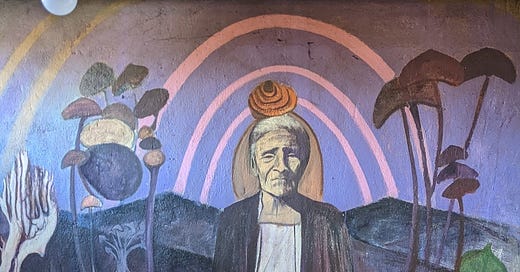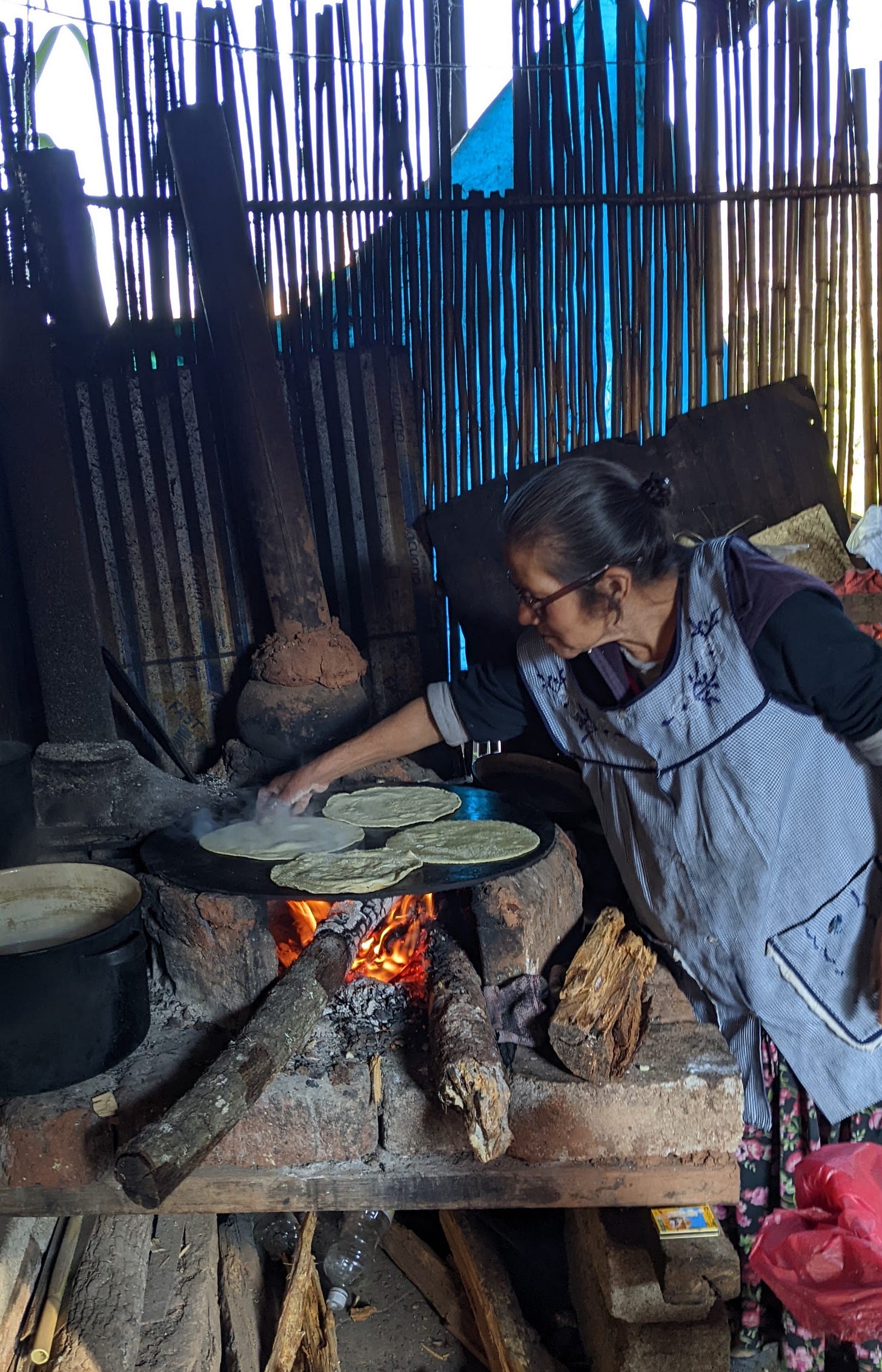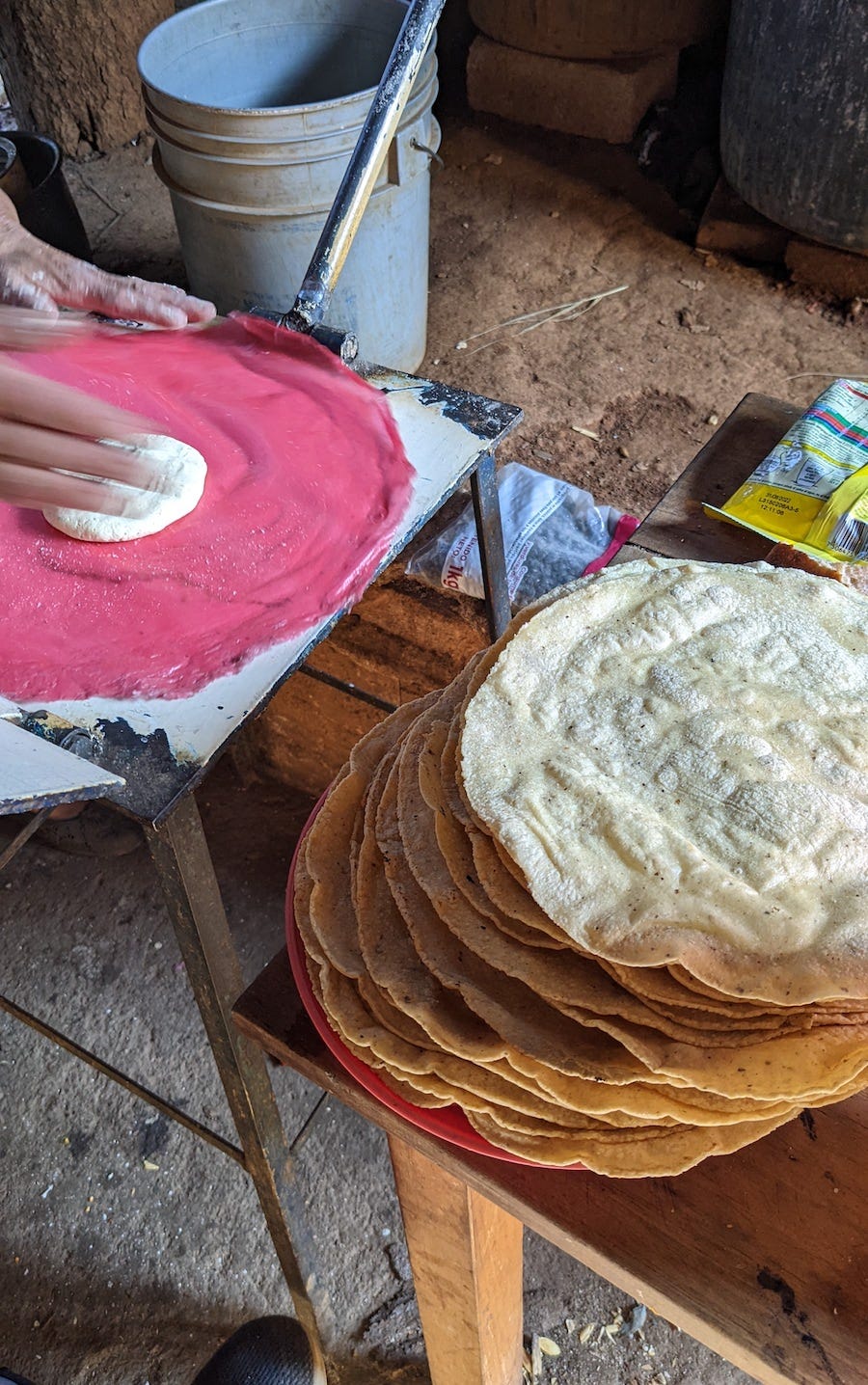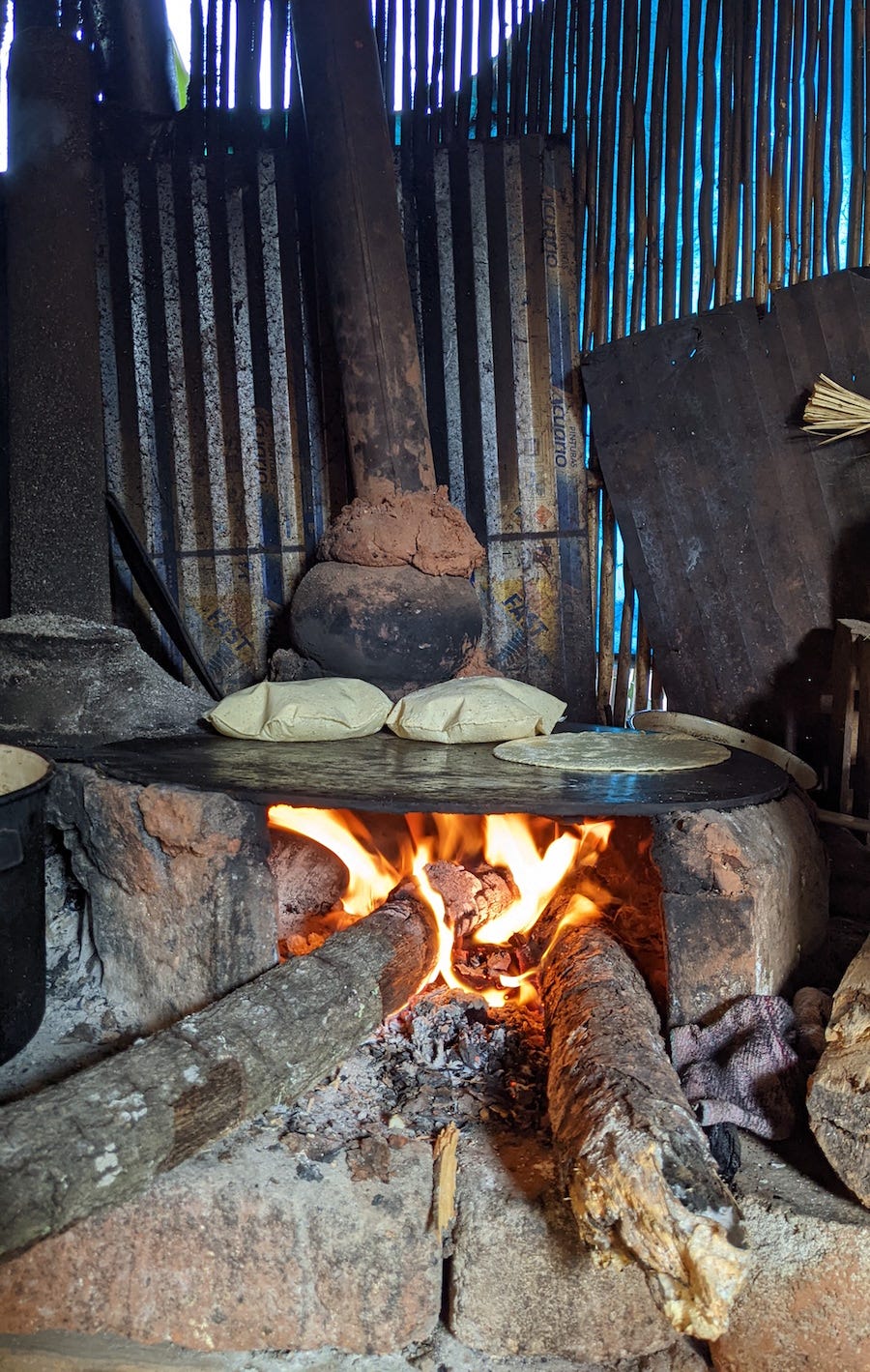Era un concierto de voces,
eran voces inauditas,
eran voces primordiales,
voces cosmicas, de vida.
En un pliegue de la sombra,
Dios oía
— Amado Nervo, Mexican poet
Eat guavas, Braulia tells me, for your stomach. That morning, I wake to the sound of a hundred eggs cracking over as many fires, set alight by the invisible hands that every day knead tray upon tray of sweet pan dulce in this village in the sky; the same sweet bread that I ate hot and fresh the previous day despite warnings I shouldn’t. They’re just out the oven, the baker had said. A warning I mistook.
I wake unable to move. The bakers’ smoke is low and thick, shading out the avocado tree next to Braulia’s kitchen, which is burning its own small fire that morning, warming the sugared coffee and the remains of the chicken broth I’d spent the night heaving up.
Later, I buy the guavas and two litres of water, plus extras for Braulia. Their perfume is heady, their flesh dense, and I eat them under the tree. Braulia brings me a mug of hot water with two singular sprigs of fresh oregano. I drink it, the ripening avocados refracted in its depths.
I didn’t expect this friendship, she said. Braulia is nearly blind and when I return to her kitchen I have to announce my presence loudly by calling my own name. I sit in her kitchen on a low stool. Her stove consists of a large round hot plate, set atop a curved cement structure in which long lengths of wood are burning. On the hot plate, a pot of coffee and a rotation of tortillas puff their way into existence.
Braulia makes tortillas most mornings to sell to neighbours who know to come to her house to buy them. She has already been out to grind the corn she’d soaked the previous night in water and cal (calcium hydroxide): that magical centuries-old process used to make the flavourful corn dough – masa harina – used for tortillas, the foundation of Mexican cooking. La tortilla es vida, tortilla is life, she says seriously. It gives you energy to work. You get used to it, to working your whole life. There is a pile of hot tortillas now. She shakes salt onto the top one and tightly rolls it hot and pliant, like a French crepe, breaking off the top and putting it in her mouth before handing the tortilla to me; taco macha!
There is a mural painted on an entire wall of her kitchen – the only bright splash of colour in this room, open to the elements. There is a woman painted on it who Braulia confirms is her. Her grey hair is tied back, her eyes closed as though in meditation. Around her, a multitude of mushrooms. Un artista lo ha hecho. An artist painted it, she says as though it’s obvious, which I guess it is. Are those psychedelic mushrooms? Claro, she responds. Again she does not expand. Do you eat them, I ask, hating myself for probing, too curious not to ask. Si, she responds in the same tone. I only take small amounts, it helps my mind, helps my body. I ask if many others in the village take the mushrooms for medicine and she says, no. When I tell her about my own struggles with anxiety, she advises me to eat raw garlic. That is all she’ll say about it and I don’t ask more.
Braulia’s son comes in, scoops stagnant water from a large drum and places it in the sink, splashing his face before leaving again. She continues patting and pressing dough into rounds and slapping them onto the hot stove. I eat another tortilla, the same way she showed me.
Later, I’m sitting in the garden that adjoins my rented room. Braulia gets commission for checking in the guests to these two converted outhouses. A small 15% from the eight or so pounds I spend per night. I’m the only guest while I’m there. She’s gone to the doctors and as I’m still too unwell to venture very far, I sit around and wait. Braulia’s son lies in the hammock and smokes a cigarette for a while. He asks me what’s wrong and I tell him I have a bad stomach and explain that maybe it’s the bread I ate the previous day to which he responds, es malo, in a tone that confirms it once and for all.
In the garden, under the avocado tree, there is a large igloo-shaped structure. It’s a temazcal, a sweat lodge, so named after the Nahuatl word Temāzcalli, meaning house of heat. Nahuatl was spoken in central Mexico back when the Spanish invaded and is still the language of the indigenous Nahua people - one of many indigenous languages and peoples in this part of the world. Braulia returns and says a few words to her son to which he responds by flicking his cigarette away, stooping into the temezcal and lobbing large stones out into the garden. Near it, there’s a place to light a fire, which he does and once hot he adds these stones to heat them. After a while of watching him, I ask him why he’s doing that and he says it’s for his mum. The doctor prescribed it.
Once hot, these stones will later go back into the dome and Braulia will enter, covering the entrance with a large tarp. She will throw water onto the stones and in it she’ll sit, a house of heat, as prescribed by the doctor. Like the making of tortillas, like the picking of mushrooms, these centuries-old rituals unfold quietly in this baker's village in the sky. While he’s heating the stones, Braulia sits beside me on the bench. I used to have long hair, braided down my back, but there was a big fire in the forest. I was out there working in the fields, it came on quickly. My hair burned and it never grew back. I now have too much sugar in my blood. My Spanish is faltering and I don’t understand the rest. I guess it’s the diabetes that’s causing her blindness. I wonder what the doctor prescribed the temazcal for, but I am amazed that he advised it at all.
The afternoon wears on, the clouds shift and the mist descends unpredictably as is the way in mountainous places. It’s the type of weather I enjoy; damp earth, distant fire, rolling mist, vast sky all merging in an instant, before returning - just as quickly - to themselves once more. Un dia volveras. One day you’ll come back.
Days later, I am at the crossroads of a highway on the Pacific coast, well over 2000 metres below the bakers’ village. A shop sells those golden fruits, which I buy quickly before running for the next minibus. I gorge on them by the open window, wondering how Braulia might feel to gorge on these same guavas, the wind whipping her hair loose, as it is mine, on this minibus spinning away from the ocean, spinning away from her home in the sky.








Great memory of your time in Mexico. Keep them coming.